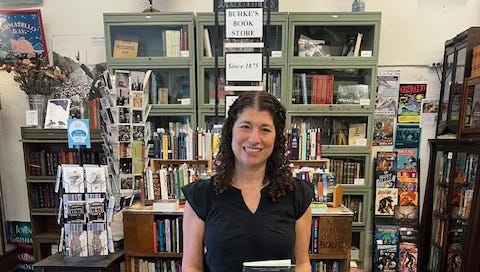Tova Mirvis, author of We Would Never
Hating the book you're working on doesn't mean you're done
Tova Mirvis is the author of the memoir The Book of Separation as well as three novels, Visible City, The Outside World and The Ladies Auxiliary, a national bestseller. Her essays have appeared in The New York Times, The Washington Post, The Boston Globe Magazine and Real Simple, and her fiction has been broadcast on NPR. She lives in Newton, MA with her family. Her most recent novel is We Would Never.
What’s the best writing advice you were ever given?
When I was in college, the wonderful writer Mary Gordon was my teacher. One time, I was telling her how I didn’t have enough time to write, and she cut me off and said, “If you are a writer, then you write.” I’ve thought about her words many times over the years when I’ve been overwhelmed with the demands of life, and hear her reminder about the need to sit myself down no matter what. My writing days might not always be as long as I’d like, and there are times that life inevitably gets in the way, but her directness and fierceness still feel like a call to action.
What’s the worst?
Years ago, someone told me that when you hate the book you’re working on, that means it’s done. And having taken years to write each of my novels, I have learned the hard way that hating what you’re working on has very little to do with whether or not you’re done. You can hate it and still not be done. That feeling is just a part of the process. I’ve spent years revising each of my books and have hated and loved and both at once. But I’ve learned that you have to put aside the way you feel and just do the work of revising. You can take a book apart, rewrite the ending, redo the beginning and the book can still hold.
What have you read lately that you wholeheartedly recommend?
I loved The Safekeep by Yael Van der Wouden. The novel has a haunting quality that I haven’t been able to stop thinking about. And I adored North Woods by Daniel Mason. The book feels completely magical, so rich and vibrant that I feel like I inhabited it more than just read it.
How about an older book—five years or more?
Crossing to Safety by Wallace Stegner is a quietly beautiful novel that I first read more than 25 years ago and still feel a sense of deep connection to even though it’s been a long time since I’ve read it. Other books in that same category for me are The Friend by Sigrid Nunez, The Hours by Michael Cunningham, and A Thousand Acres by Jane Smiley.
How far will you read before you stop or do you finish every book you begin?
I used to finish every book no matter what, but I don’t anymore. I don’t make a decision to stop, I just sort of drift away into another book, intending to come back and finish but rarely do. I have many of these books that I am in the middle of, all piled up on my nightstand waiting for me to return
When you begin a draft, does it go straight onto the computer or do you start with a pen or pencil, or typewriter, or…..
I do start on my computer and write out ideas. At first it’s all very messy. I create multiple files (too many), for scenes, for character studies, for backstories, for outlines. Eventually, an order starts to emerge. But I also have a notebook I carry around with me. I don’t write fleshed out scenes in it but I make notes, work out problems, create lists of events, and let myself just think on the page. Sometimes I try to sketch out the shape of a scene or chapter. My notebook is where I feel the most free.
What do you do when you hit a wall?
I get frustrated, decide I should abandon the project, decide I’ve wasted years of my life, decide I should get a different job... and then I take a deep breath and remind myself that I’ve been in this place before with every book and will surely be here many more times in the future. Sometimes I try to talk out the issue with a writer friend and see if a new perspective can help me solve the problem. And sometimes I step away, go for a run, read a book, walk my dog, and come back when I can see the work anew.
If you’d like to hear my interview with Tova Mirvis, click here.




